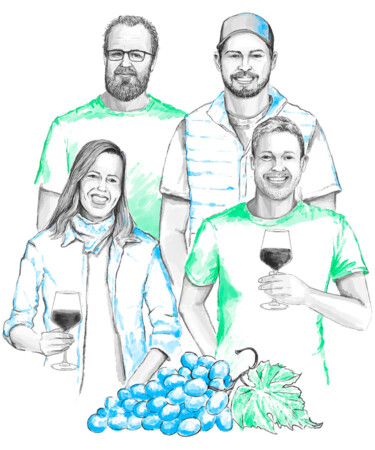In a decade or so, we might look back at 2022 as the year when boxed wine finally broke free from some of the stigma attached to the format and made a compelling case to the broader wine-drinking market. If indeed that proves to be true, one of the catalysts was undoubtedly the small but noteworthy venture of the winemaking team at Tablas Creek, led by executive winemaker Neil Collins and proprietor Jason Haas.
Tablas Creek has been at the forefront of sustainability in the wine industry for decades, starting as many wineries do with vineyard practices. “Some of that change came from our gradual realization that organic farming is great, and it’s an important piece of what we’re doing,” says Haas, “but if what we’re trying to do is amplify our terroir, it’s not that we should be replacing chemical inputs with non-chemical inputs, but that we should be eliminating all outside inputs and instead make our farm a self-sufficient unit.”
That’s what eventually led Haas and the team, which also includes senior assistant winemaker Chelsea Franchi and assistant winemaker Craig Hamm, to biodynamics, which drove them to think about their land more holistically. In addition to a more robust composting program, the team got their first sheep for the vineyard flock, planted fruit trees among their new blocks, and thought about their cover crops differently.
In 2018, Tablas Creek was invited to be a part of the pilot program for the Regenerative Organic Certification, which exists to create an agricultural system that doesn’t just minimize the harm that agriculture can cause, but to actively use agriculture to attempt to combat climate change, resource scarcity, and other challenges. Seeing how the changes made as a part of the program had positive downstream effects throughout the winery emboldened Haas and his team to continue looking for ways to further improve, leading to a sizable kegged wine program that started the alternative packaging experimentation.
It was really a carbon footprint analysis, laid out in a blog post that Haas wrote in May 2021. As part of a comprehensive look at the successes and missing elements of their sustainability goals, the post highlighted how much of an impact a bag-in-box program could have on that carbon footprint, both because packaging is a big driver of the carbon footprint of the winery and because Tablas Creek had already done so much to reduce its footprint in other ways. At the time, Haas dismissed the notion of boxed wine due to the widespread stigma around the format: that boxed wines were low-quality, unserious, and that no one would pay premium prices for them.
A comment in response to that post pushed back, suggesting that Tablas Creek could perhaps be pioneers in the boxed wine space, using its sterling reputation for both quality and sustainable practices as a way to encourage people to take a chance on the format. And that’s just what it did.
In February 2022, Haas wrote a follow-up piece entitled “Why we believe the time is right for a $95 box of wine,” where he laid out the argument for the format and announced that the winery had diverted a small amount of its production of the 2021 Patelin de Tablas Rosé into 324 3-liter boxes. Defying all their expectations, they sold out in four hours, and subsequently had similar success with the 2021 Patelin de Tablas and Patelin de Tablas Blanc.
“It’s only significant in a small way right now,” says Haas, “but if it helps destigmatize a package that has enough real benefits for consumer and environment, then certainly the attention that it’s gotten is a good thing.”
The venture got a lot of traction within fine-wine circles, and while piquing interest isn’t quite the same as affecting real change, even drawing attention to the potential benefits of boxed wine can ripple through the industry. “We have been hearing from other wineries that they’re either trying the same thing or they’d like to try it,” Haas says. “If we could shift even 10 percent of the wine that’s sold in California from bottles to this, that is a hugely needle-moving thing to do.”
This story is a part of VP Pro, our free platform and newsletter for drinks industry professionals, covering wine, beer, liquor, and beyond. Sign up for VP Pro now!
